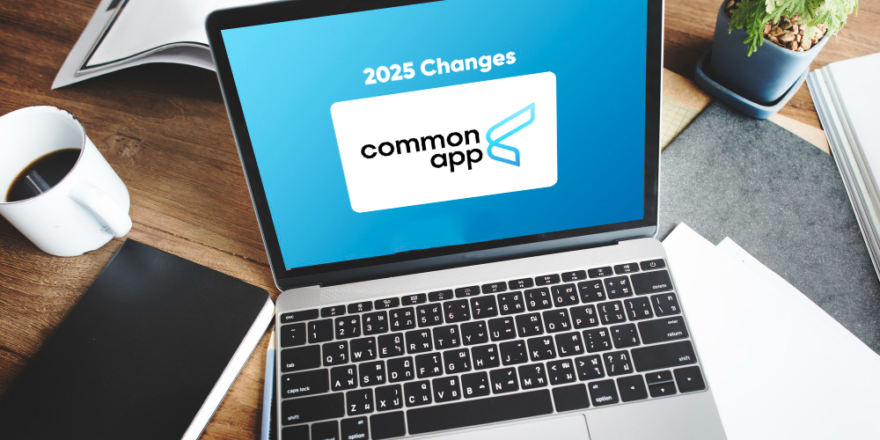- Blog
- > Applications and Essays
Changes to the Common App for 2025-2026
- Dr. Rachel Rubin
- | March 14, 2025

The Common Application, a platform used by millions of students each year for college admissions, has announced several notable updates for the 2025-2026 application cycle.
While maintaining the same seven essay prompts that students have come to know, the Common App is implementing changes to its Additional Information section and expanding to include community colleges for the first time. These modifications reflect the organization’s ongoing commitment to improving accessibility and creating a more inclusive college application process.

Common App Essay Prompts Remain the Same
Students preparing for college applications will find welcome news in the Common App’s decision to maintain all seven essay prompts for the 2025-2026 application cycle. This stability represents a deliberate choice based on extensive feedback from the educational community.
According to the official announcement, the Common App made this decision “based on positive feedback from students, counselors, teachers, and colleges.” The organization will continue to monitor trends in prompt selection across different student populations, using those insights to inform any future updates.
For the upcoming 2025-2026 application cycle, students will respond to the same seven prompts that have proven effective at helping applicants share their unique perspectives:
- Some students have a background, identity, interest, or talent that is so meaningful they believe their application would be incomplete without it. If this sounds like you, please share your story.
- The lessons we take from obstacles we encounter can be fundamental to later success. Recount a time when you faced a challenge, setback, or failure. How did it affect you, and what did you learn from the experience?
- Reflect on a time when you questioned or challenged a belief or idea. What prompted your thinking? What was the outcome?
- Reflect on something that someone has done for you that has made you happy or thankful in a surprising way. How has this gratitude affected or motivated you?
- Discuss an accomplishment, event, or realization that sparked a period of personal growth and a new understanding of yourself or others.
- Describe a topic, idea, or concept you find so engaging that it makes you lose all track of time. Why does it captivate you? What or who do you turn to when you want to learn more?
- Share an essay on any topic of your choice. It can be one you’ve already written, one that responds to a different prompt, or one of your own design.
This consistency provides several notable benefits for students and their advisors.
For students, the unchanged prompts allow for earlier brainstorming and drafting without concern that their work might become irrelevant due to prompt changes. Many juniors can begin considering these questions months in advance, giving them ample time for reflection and revision.
For counselors, stability means they can refine and build upon existing resources rather than developing new guidance materials each year. This allows for more targeted, proven advice based on what has worked well for previous applicants responding to these same prompts.
Perhaps most importantly, maintaining consistent prompts shifts the focus to where it belongs—on student stories and authentic expression rather than adapting to new questions. This decision acknowledges that the value of the personal essay lies not in the prompts themselves but in how effectively they enable students to communicate their unique perspectives and experiences to admissions committees.
From “Community Disruption” to “Challenges and Circumstances“
The 2025-2026 Common App features a significant update to the optional Additional Information section. Beginning August 1, 2025, the current “Community Disruption” question will be replaced with a broader “Challenges and Circumstances” question.
This terminological shift reflects the Common App’s understanding that students face diverse challenges beyond community-level disruptions. The previous language potentially limited the range of experiences students might share, while the new framing acknowledges that “a student’s application and achievements may be impacted by challenges or other circumstances.”
The updated question explicitly includes an expanded range of potential challenges:
- Access to safe study space and reliable technology
- Community disruption (violence, protests, teacher strikes)
- Discrimination
- Family disruptions (divorce, incarceration, job loss, health issues)
- Family obligations (caregiving, financial support)
- Housing instability or homelessness
- Military deployment
- Natural disasters
- Physical and mental health concerns
- War, genocide, or other hardships
This comprehensive approach validates experiences that students might previously have hesitated to mention. The change benefits more students with diverse backgrounds by acknowledging that achievement doesn’t happen in isolation—personal circumstances fundamentally shape educational opportunities.
The revised question emphasizes that sharing this information “can help colleges better understand the context of your application” and may connect students with “support and resources.” This framing helps applicants understand that describing their challenges can provide crucial context that admissions officers want to consider when evaluating applications.
For students who have faced significant obstacles, this redesigned question offers a dedicated space to share important contexts that might otherwise remain invisible in their application while maintaining respect for privacy through its optional nature. That said, students should only respond if they faced a significant challenge or want to offer context that admissions officers should know about when reviewing their application.
Reduced Character Limits for Additional Information
The second significant change to the 2025-2026 Common App involves substantial reductions to character and word limits for the Additional Information questions.
For first-year applicants, the word limit for the Additional Information question will decrease from 650 to 300 words maximum. Transfer applicants will see an even more dramatic change, with the character limit dropping from 3500 to 1500 characters. These reductions will require students to be considerably more concise in their responses.
According to the Common App announcement, these changes result from “conducting listening sessions and consulting with our member, counselor, and student advisory committees.” The organization sought diverse perspectives to ensure the changes would serve the needs of their wide-ranging stakeholder groups while making the application more focused and manageable.
Students exceeding the new 300-word or 1500-character limits will receive an error message alerting them to revise their responses accordingly.
Importantly, the Common App has built-in protections for students who begin working on their applications before the change takes effect. Students will not lose content written prior to August 1, but they will need to revise their responses to comply with the new limits.
For transfer applicants, student responses to the “Additional Information” question created before August 1 will not roll over, requiring these students to create new responses within the reduced character limits.
These changes underscore the importance of concision in college applications and reflect a broader trend toward more focused supplemental questions. For students planning to apply in the 2025-2026 cycle, beginning to draft responses with these new limits in mind will help avoid last-minute revisions when the changes officially take effect.

Community Colleges Join the Common App
In a landmark development for college accessibility, the Common App has expanded its reach to include community colleges for the first time. This significant change aims to democratize higher education access by bringing two-year institutions onto the same application platform used by hundreds of four-year colleges.
The initiative began through a strategic partnership with the Illinois Community College Board, which has brought seven Illinois community colleges into the Common App system. For the 2024-2025 application season, four community colleges joined the platform: Sauk Valley Community College, Rend Lake College, Carl Sandburg College, and Black Hawk College. The momentum continues into the 2025-2026 cycle with three additional institutions: Lincoln Land Community College, Oakton College, and Triton College.
This change marks a significant evolution for the Common App, which has historically focused primarily on four-year institutions. With few exceptions like Miami Dade College (which offers both associate and baccalaureate degrees), the platform had not previously embraced community colleges at this scale.
Technical Changes and Implementation Timeline
August 1, 2025 marks the official implementation date for all changes to the 2025-2026 Common App. This date coincides with the platform’s annual rollover when the application refreshes for the new admissions cycle.
For students who establish their Common App account before August 1, most of their basic information will transfer, including profile details and colleges added to their list.
However, responses to the Additional Information question for transfer students will not carry forward. Additionally, any responses exceeding the new word and character limits will need revision, even if they were created before the rollover date. The system will flag these responses with error messages, requiring students to edit their work to meet the new requirements.
A New Chapter in the College Admissions Process
The 2025-2026 Common App changes reflect a thoughtful evolution focused on accessibility, clarity, and inclusivity. From expanding to community colleges to refining how students share personal challenges, these updates aim to create a more equitable application process.
By announcing these changes months in advance, the Common App gives students, counselors, and colleges time to prepare, ensuring a smoother transition to these more streamlined requirements.
As college admissions continue to evolve, these adjustments demonstrate a commitment to meeting the diverse needs of today’s applicants while maintaining the core elements that have made the Common App a trusted platform.


